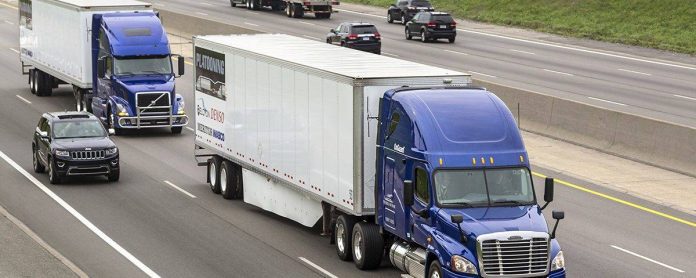Peloton Technology carried out the truck platooning demo with the Michigan Department of Transportation
Peloton Technology, a developer of connected and automated vehicle systems for U.S. and global freight carriers, conducted a live demonstration of driver-assistive truck platooning in Michigan.
The demonstration which took place on I-96 in the Novi area, and was made possible through a collaboration with the Michigan Department of Transportation, Michigan State Police, and Michigan Economic Development Corporation.
The company said the demo featured a pair of Peloton-equipped Volvo VNL670 class 8 trucks platooning at approximately 65 feet allowing participants to experience how this semi-automated and connected vehicle technology, including vehicle-to-vehicle (V2V) communications, assists drivers in a real-world setting.
Peloton said this demonstration in Michigan represented a key step towards commercial deployment of the Peloton platooning system, which is expected to occur during 2018.
“Michigan has been a national leader in the legislative approval of connected and automated vehicles so we were excited to demonstrate the Peloton truck platooning system in the Detroit area as a stepping stone towards commercial deployment within the state” said Steve Boyd, Peloton co-founder and VP of external affairs. “We look forward to our ongoing work with the State of Michigan and industry partners across the region as we bring driver-assistive truck platooning into commercial deployment.”
“We are committed to advancing safety and efficiency in commercial trucking operations and accelerating the economic benefits that result from improving the movement of goods,” said Kirk Steudle, director of the Michigan Department of Transportation. “Many companies in Michigan’s automotive industry are playing a key role in the development of connected and automated vehicle technologies like platooning.”
The Michigan law enabling testing and commercial deployment of truck platooning was enacted in 2016. Following Michigan’s enactment of this law, eight states have confirmed allowance for commercial deployment of driver-assistive truck platooning: Arkansas, Georgia, Nevada, North Carolina, Ohio, South Carolina, Tennessee, and Texas. Additional states are considering confirming allowance for driver-assistive truck platooning in 2018, Peloton said.
Peloton said its driver-assistive system allows drivers to form two-truck platoons. The system assists drivers with safety technology, detecting and making space for any vehicles that cut in between the trucks.
Peloton’s two-truck system enables pairs of trucks to coordinate their speeds and maintain a safe following distance. The Peloton system limits platooning to appropriate multi-lane, divided, limited access highways. The system also orders pairs of trucks and determines their optimal following distance and enables the rear truck in a platoon to respond to braking by the lead truck in approximately a tenth of a second, eliminating the normal delay from driver perception and reaction time, the company said.
Truck platooning is capturing the attention of governments across the world. In August, The U.K. government confirmed it has allocated £8.1 million ($10.4 million) to carry out track platooning trials.
The Transport Research Laboratory (TRL) will carry out the truck platooning trial, with funding provided by the Department for Transport and Highways England. The initiative follows a government-funded feasibility study which recommended a trial to examine the benefits and viability of platooning. The trial will be carried out in three phases, with the first focusing on the potential for truck platooning on the UK’s major roads. The initial research will help decide details such as distance between vehicles and on which roads the tests could take place. Trials are expected on major roads by the end of 2018.

